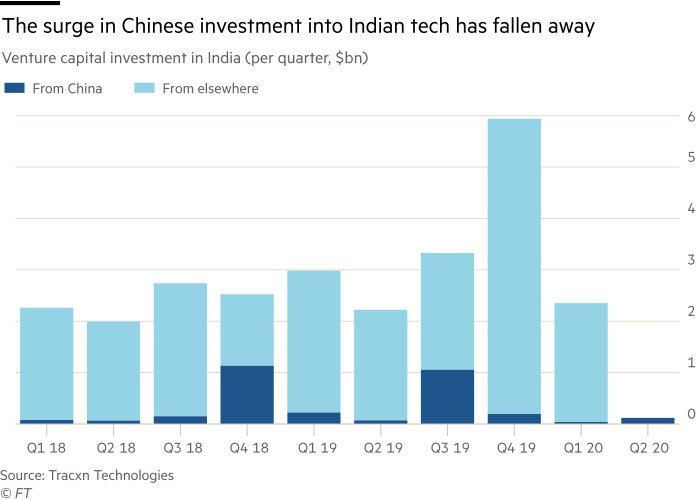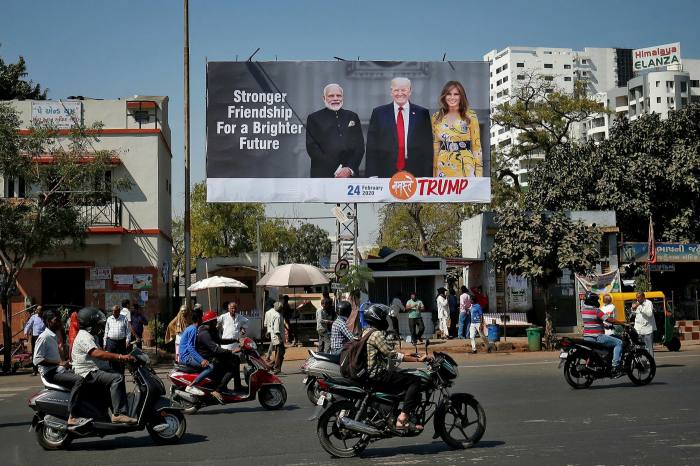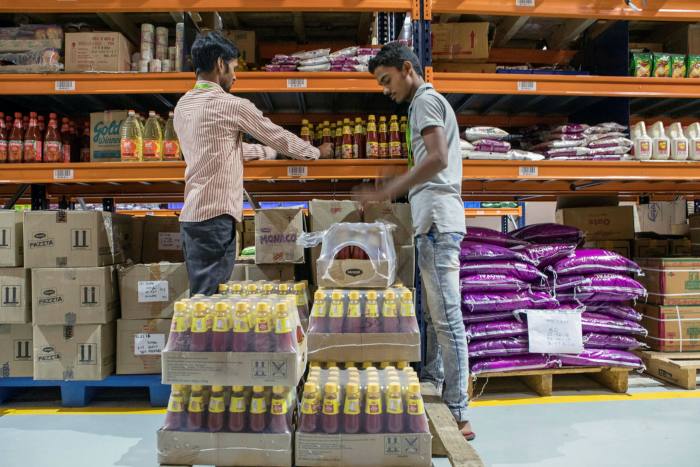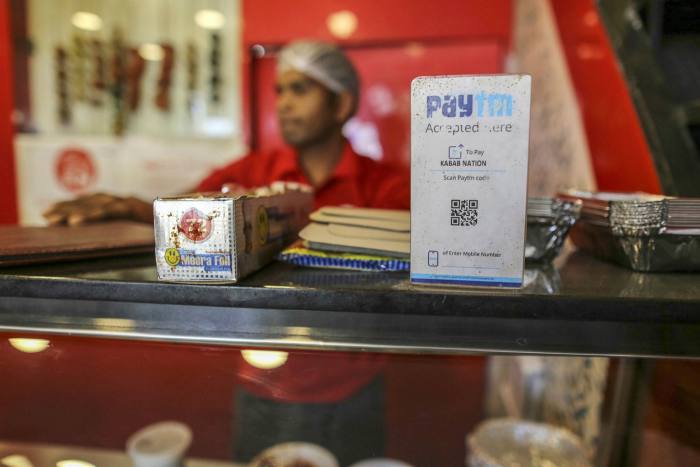
[ad_1]
Just days after 20 Indian soldiers were killed in a brutal clash with Chinese troops on the Himalayan border in June, a group of food delivery drivers in the eastern city of Kolkata found a way to express their outrage.
In front of a banner showing photographs of the slain soldiers, the drivers burnt the red uniforms used by Zomato, the Chinese-backed food delivery start-up they worked for. “Indian army soldiers have been killed, but Zomato loves China,” they chanted as flames engulfed the company’s logos.
The protest exemplified the way in which a burst of nationalist anger that followed the border clash has been directed at the billions of dollars of Chinese investment into India’s tech sector.
The animosity is jeopardising the position that China’s tech groups have rapidly built up in India’s booming start-up scene and has opened the door for US tech companies and funds to take on their Chinese rivals — including Facebook, Google and Amazon. As China stumbles, Silicon Valley has smelled blood.

The competition between US and Chinese tech giants for the Indian market is intense, with access to a market of 1.4bn people spurring multibillion-dollar bets. Whichever companies — whether foreign, foreign-backed or local — eventually seize commanding positions in the Indian market is likely to have a big influence on the future shape of the global technology industry.
This rivalry is also taking place amid a broader geopolitical contest between the US and China, one where India is becoming an increasingly important factor and where technology is a central battleground.
“What’s happening in India represents the first time the two major tech superpowers are going head to head not just in a battle but also in a tech war,” says William Bao Bean, a Shanghai-based partner at global venture capital company SOSV.
The recent tensions, he adds, are pushing India “towards the American ecosystem”.
Indian prime minister Narendra Modi has given indications of a similar shift, lauding the “US- India friendship” on Twitter in July. This was not long after a sombre Mr Modi appeared on national television declaring India was “hurt and angry” with China following the Himalayas incident.

Enraged opposition leaders and former military generals went even further, condemning “Chinese aggression”. With crowds destroying Chinese-made electronics in street protests in several cities, New Delhi banned 59 Chinese mobile apps on the grounds that they were a threat to the country’s security.
Friction between the two nuclear-armed rivals is nothing new, including the two fighting a border war in the 1960s. Indeed, fractures in the uneasy Sino-Indian relationship were already apparent before the incident in the Himalayas. Rising anti-Beijing sentiment during the coronavirus crisis prompted New Delhi in April to tighten restrictions on foreign direct investment — designed to block opportunistic Chinese takeovers.
But experts say this is a watershed moment.
“There was a lot of work put into India-China relations in the past 30 years; most of that has been reset,” says Anand Prasanna, managing partner at Indian venture capital fund Iron Pillar. “This is a turning point for Chinese investment in India tech.”
Chinese deals drying up
The boom in Chinese interest in Indian tech is a relatively recent phenomenon. As recently as five years ago, Chinese tech investment in the vast Indian subcontinent was negligible. This then exploded in 2017 and 2018, led by Alibaba and Tencent. Chinese venture capital investments in India totalled $4.3bn between the start of 2017 and June this year.

The sense that China’s tech leaders have seen India as a second home market is borne out by the profile of their investments. Among India’s top 10 tech unicorns — start-up companies valued at more than $1bn — seven are backed by a Chinese strategic investor, against only one that is backed by a US equivalent.
Chinese backing also extends well beyond the top 10. Research by Gateway House, a Mumbai-based think-tank, shows that out of India’s 30 existing unicorns, 18 are funded either by China’s big technology companies or by Chinese venture capital funds.
“They are trying to recreate in India what they have already done in China,” says Amit Bhandari, a fellow at Gateway House.
Alibaba and Tencent, in particular, have shown a clear intent to build networks of portfolio companies that have the potential to mutually reinforce each others’ operations in India.
As in China — where Alibaba bolsters its ecommerce brands such as Taobao and Tmall with a digital payments business, Alipay, social media via Weibo, digital entertainment through Youku, and logistics through Cainiao — the group is building stakes in a collection of Indian and south-east Asian start-ups.

In India, Alibaba Group companies have invested in Snapdeal, one of the country’s biggest ecommerce sites, BigBasket, an online supermarket, Paytm, a leading payments app, Dailyhunt, a news site that serves content in 14 local languages, Xpressbees, a parcel service, Zomato for food delivery, and several others.
Tencent shows the same approach, having invested in ecommerce, online education, food delivery, fantasy sports, a B2B commerce site and several other start-ups in India. To a lesser extent, other Chinese companies, including Meituan Dianping, ByteDance, Xiaomi and Didi Chuxing, are following similar strategies.
At the same time, dozens of China’s biggest mobile phone apps have flourished in India. According to Sensor Tower, a US company that tracks apps, the three most popular Chinese apps from India’s Apple and Google Play stores — UC Browser, TikTok and SHAREit — have had more than 1bn downloads since 2014.
Zomato, founded in 2008, has received proposed funding of $560m — more than half of what it has raised to date — from Ant Financial, the payments affiliate of Alibaba, to fuel its blistering growth.
Gaurav Gupta, co-founder and chief operating officer at Zomato, says there is no doubt over the role played by Ant Financial in his company’s development. Not only did the Chinese company come with deep pockets, it also transferred knowledge on how to “scale fast” and “penetrate deep”, Mr Gupta says.
![Madhur Singhal of Praxis Global Alliance says the India-China tensions have 'definitely led to some reduction in [US-China] competition in deals'](https://www.ft.com/__origami/service/image/v2/images/raw/https%3A%2F%2Fd1e00ek4ebabms.cloudfront.net%2Fproduction%2F06f2332d-a199-4ca6-9171-77c5784750f0.jpg?fit=scale-down&source=next&width=200)
But the fallout from the political tensions between New Delhi and Beijing has already delayed funding for young companies such as Zomato, closely tied to China. At least $100m of that money from Ant Financial has been delayed due to the uncertainty over how the new foreign direct investment rules will impact on previously announced investments. Zomato is no isolated case. There are already signs this record flow of money is slowing down.
The number of fundraising deals involving one or more Chinese investors fell from six in January this year to zero in June, according to Refinitiv, a data provider. By comparison, there were nine venture capital deals involving a US investor in June.
“It’s definitely led to some reduction in competition in deals,” says Madhur Singhal, managing director at consultancy Praxis Global Alliance.
Chinese mobile apps, which have proliferated across India, are another casualty. New Delhi’s ban on some of China’s biggest apps in late June, was a particular blow for video streaming app TikTok, which is owned by Chinese technology group ByteDance and has more than 200m users in India, counting it as its biggest overseas market.
Long-simmering public discontent is even articulated by companies that have benefited from Chinese money.
Yashish Dahiya, chief executive of PolicyBazaar, a $1.65bn insurance aggregator in India, of which Tencent holds a 10 per cent stake, is blunt.
“I think for the last 30 years . . . the Chinese government has not played by the rules. They like to play by the rules when it is to their advantage, but they don’t provide the same rules to outsiders in their country.”

Buying the ‘India story’
It is in this febrile climate that Silicon Valley has seized its golden moment. Mr Modi’s warm words that the US and India were “natural partners” came hot on the heels of a number of deals by US Big Tech.
In July Google pledged $10bn of investment in India as part of a vague but nonetheless impressive sounding “India digitisation fund”. That same week the search company announced it would invest $4.5bn in Jio Platforms, the fast-growing digital business owned by India’s richest man, Mukesh Ambani, that spans everything from telecoms to ecommerce to video streaming. The Google deal followed a $5.7bn investment by Facebook in Jio in April.
Although much of this recent dealmaking has been focused on a single company, Jio, it builds on earlier investments and attempts to appeal to India’s young and digitally-savvy market.
Google Pay has become the biggest digital payments provider in India after its launch in the country in 2017. According to a May 2020 report by Bernstein, Google Pay led the payments market in India, followed by PhonePe, the digital payments unit of Walmart-owned Flipkart, Amazon Pay and lastly Paytm, the $16bn market darling which is backed by Alibaba. India is also Facebook’s biggest market in terms of users and the company is set to launch its own WhatsApp Pay service imminently.
The approach of US investors — aside from payments — had until now been quite different to their Chinese rivals.
“US investors [were] mostly funds while Chinese investors are the internet giants seeking to recreate the ecosystems they have at home,” says Mr Bhandari of Gateway House.
The main exception had been Flipkart, India’s leading ecommerce site, which was bought for $16bn by Walmart in May 2018 after the US retailer bought the stakes of several investors, including Tencent, Naspers, eBay and Microsoft.

But now, says Karthik Reddy, co-founder of Blume Ventures, an investor in start-ups, the anti-China sentiment and takeover fears which led to the FDI rule change have already tilted the playing field towards US investors.
“Jio is a fundamental example of that,” he says, referring to the wave of US investors that have followed Facebook and Google into the platform, including private equity groups Silver Lake and KKR. “The Americans are buying more and more into the Indian story.”
Warning signs for US investors
The harsh turn in sentiment against China underscores the capricious nature of investing in emerging markets, even one as dynamic as India. For any foreign investor, including those from the US, the risk of being hit with new regulations remains high. India has repeatedly used such tactics to assert local control over successful international businesses.
Europe’s Cairn Energy has been bogged down by a battle over $1.6bn in retroactive tax demands. Vodafone’s Indian joint venture has also warned it may “shut shop” after being slapped with retroactive levies.
Walmart invested in Flipkart only to have the ecommerce rules changed in favour of domestic rivals after its entry to the market. When Amazon founder Jeff Bezos came to India in January, commerce minister Piyush Goyal declared that the tycoon’s investment was no big “favour” to India.
UberEats’ fate in the food delivery sector serves as another cautionary tale. On a well-publicised visit in 2016, Travis Kalanick, Uber’s erstwhile boss, met Indian cricket superstar Sachin Tendulkar and discussed movies with Bollywood star Salman Khan. He told local media that his company “couldn’t be more excited to serve India”.
UberEats began business in Mumbai in 2017 in an initiative that senior executives described as a “major step in our global expansion”. But by the end of 2019 it was in retreat.

It could not withstand the “burn rate” required to compete against the superior financial firepower of Zomato and its rival, Swiggy, which is backed by Tencent and Meituan Dianping, China’s biggest food delivery platform. In January 2020, Uber agreed to sell its food delivery business in India to Zomato in exchange for taking a minority stake.
Indeed there are fears that investor enthusiasm for the country may have run far ahead of reality. The losses racked up by Zomato, Swiggy and UberEats in India’s food delivery sector are by no means unusual.
There is also some scepticism over the frenzy of dealmaking into four-year-old Jio Platforms which has raised $20bn from global investors in the past three months alone. Mr Ambani now says he has eliminated $20bn in net debt.
“Companies have effectively given Jio $20bn to . . . sponsor its debt,” says one Asia-based fund manager, referring to how Mr Ambani has long wanted to make Reliance Industries debt-free.
The mentality in the tech industry, however, is that it is better to spend big and build a dominant position rather than lose out on the most lucrative growth market for foreign companies. In spite of the losses, investors are piling into the evermore competitive landscape.
Experts think China is down but not out. Chinese companies have not been totally frozen out of India by the FDI rules, says Mr Singhal. Even Ant Financial and Zomato are “confident” the $100m in limbo will eventually go through, burnt company shirts and all.
Mr Bao Bean says it is too soon to declare the US the winner, though the China side was definitely “caught off guard” by the events of the past few months. “Chinese tech and money are still very strong in India,” he says. “This is just one win for the American internet leaders.”
[ad_2]
Source link